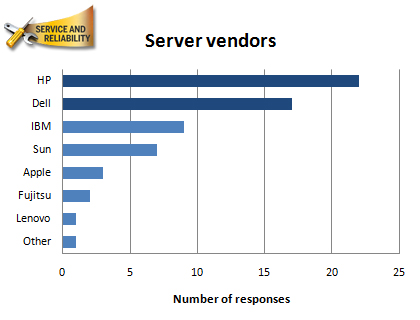Service & Reliability Survey 2010: Servers

SERVERS
Which vendors do you use for servers?
We received information on servers from 32 respondents. On average, the organisations they worked for used two (1.97) vendors each, giving a total of 63 responses. Only two vendors, HP and Dell, received more than 15 responses:

Other vendors cited: Virtual Machine Company
Which operating systems are installed on your servers?
Windows Server 2003 is the most prevalent operating system in our survey sample: 8 respondents (25 percent of the sample) report that WS 2003 is installed on 'all' of their servers. Windows Server 2008 is also well represented, followed by various flavours of Linux and Unix. Mac OS X Server, by contrast, barely registers here.
Other operating systems installed:, IBM AS/400, OpenVMS, Microsoft Terminal Services, Solaris, THEOS, Windows 2000
When it comes to virtualisation, hypervisors from VMware and Citrix are better represented than Microsoft's Hyper-V — as might be expected given the length of time these companies have been in this market. It'll be interesting to see how this pattern develops in the future:
Other operating systems installed:, IBM AS/400, OpenVMS, Microsoft Terminal Services, Solaris, THEOS, Windows 2000
Which server form factors are deployed?
Rack-mounted and traditional tower-format servers are more prevalent in our survey than space-and power-efficient blade servers. Over time, we expect blade servers to increase in frequency at the expense of tower systems.
What are the points of failure on your servers?
Servers are designed to run mission-critical business applications and services, so reliability is an absolute must. But, like any other computer, servers occasionally fail. We asked about nine potential points of failure and found that six — power supply, disk subsystem, software & drivers, cooling system, motherboard (CPU, RAM, chipset) and network adapters — rated at least one mention in the 'very common' or 'common' categories:
Rare points of failure in servers are the ports, expansion slots and system case:
How do you rate your server vendor's technical support?
HP's and Dell's technical support is rated as 'good' or 'average' by the majority of our survey respondents. Both vendors have a few (<5) 'excellent' ratings, but also a smattering of dissatisfied 'poor' and 'abysmal' scores. We've also included data for IBM and Sun, which have between 5 and 10 responses each and appear to show a similar picture.
Other vendors cited: Apple, Fujitsu, Lenovo, Virtual Machine Company
Although we'd like more data, there's a suggestion in our survey that technical support is generally rated higher for servers than it is for client hardware such as desktops, notebooks and smartphones: the ratings charts for servers tend to have 'good' as the modal tech support rating, whereas the client hardware charts are more often clustered around 'average'. This would make sense, given that servers are more expensive and more mission-critical products.
How do you rate the reliability of your servers?
The reliability ratings for HP and Dell servers, like those for tech support, are centred around 'good'. However, in this case both vendors get more 'excellent' scores than 'average' ones.
Other vendors cited: Apple, Fujitsu, Lenovo, Virtual Machine Company
How likely are you to repurchase servers from your current vendor?
Given our respondents' general satisfaction with HP's and Dell's tech support and reliability, it's no surprise to see them mostly happy to reward these vendors with further server purchases:
Other vendors cited: Apple, Fujitsu, Lenovo, Virtual Machine Company
How does your server vendor's environmental policy affect your buying decision?We've heard a lot about green datacentres in recent years, so you'd expect vendors' environmental policies to have significant traction with server purchasers. However, our survey — limited as it is — suggests that other factors remain more important: only three respondents (one HP, one Dell and one IBM customer) rate green issues as 'paramount' in the server buying decision:
Other vendors cited: Apple, Fujitsu, Lenovo, Virtual Machine Company